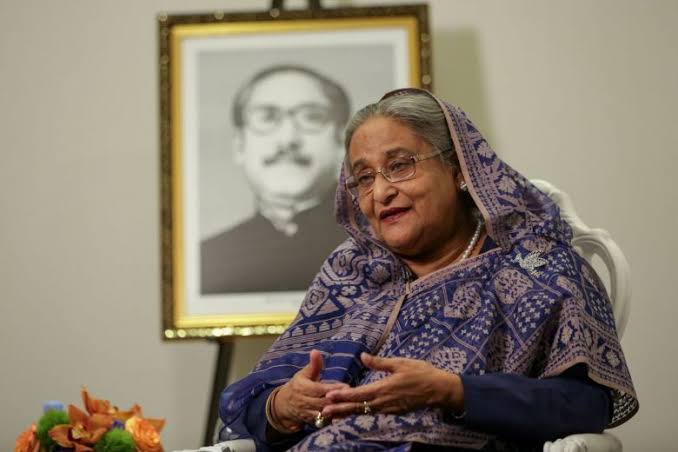Shamiur Rahman Lipu
Published:2020-09-29 17:29:45 BdST
BD PM for prioritising a green Covid recovery
Prime Minister of Bangladesh Sheikh Hasina, in an article published in The Financial Times (FT), said that prioritising a green recovery from the coronavirus pandemic is right step.
“A recent analysis by Vivid Economics of the response to Covid-19 suggests that its impact on climate change has been mixed. I salute the EU for prioritising a green recovery,” she wrote.
“We plan to do the same in Bangladesh, and I fervently hope my fellow government leaders as well as business leaders will do it as well,” she added.
In the article she asserted that in Bangladesh, water is a matter of life and death.
“My country is a land of great rivers, vast coastlines and resilient people. But 2020 has been a test for us like no other,” she wrote. “In May, cyclone Amphan left a trail of devastation in its path in the south-western parts and then monsoon rains marooned one-third of the country, leaving thousands of people displaced and damaging vast tracts of crops.”
Hasina gave a vivid description of flood and sufferings of people.
“When water batters through your house, destroying your possessions, leaving pollution and disease in its way, it is tough. It is doubly tough in a year when Covid-19 has struck, making it difficult to access clean water vital for sanitation and pandemic prevention,” she continued.
“As I write in Dhaka, the waters of the Brahmaputra and Padma basins are receding. My people are getting their lives back, albeit under the shadow of coronavirus,” she added.
Hasina also said that the government is assessing flood defences and providing relief to those affected adding that in Bangladesh there is always a next time and the climate crisis does not sleep.
She warned the countries that feel they are immune to the climate crisis, to bankers and financiers who feel they can escape it.
“Covid-19 has shown that no country or business can survive alone,” she added. “Only together can we tackle global crises. It has also demonstrated that prevention is easier than cure. That makes 2020 the year we must commit to listen to scientists.”
Hasina argued that a triple crisis of climate, health and nature created a planetary emergency.
“Bangladesh is not alone in feeling the wrath of nature,” her article mentioned. “This year fires have raged in the Amazon, Australia, California and Siberia. Cyclones and hurricanes have battered the US, Caribbean and much of Asia. The UK, host of the COP26 climate summit next year, suffered floods.”
Hasina argued that climate change stems from the lack of sustainability of human activities. “We are experiencing floods, rainfalls, cyclones, heatwaves, landslides and droughts in recent years with more fury and intensity, which also endangers food security,” she continued mention that everyone needs to recognise their gravity.
She also mentioned that a metre rise in sea level would inundate numerous small island and coastal nations.
As floods from melting glaciers would bring catastrophe to mountainside countries, she cautioned that millions of people would become climate refugees. “The world does not have the capacity to shelter such numbers,” she added.
Hasina made G20 countries ‘responsible for about 80 percent of emissions’ while the bottom 100 countries only account for 3.5 percent.
“The emitters have greater responsibility and must make larger contributions through the mitigation needed to cap the global temperature rise at 1.5C,” she asserted.
She also pointed out that being the current president of the Climate Vulnerable Forum, Bangladesh is ‘seeking more support from the international community and the G20’ for enhanced finance along with access to technology to rapid adaptation for the countries are at most risk.
“In that group, Bangladesh is one of the best prepared for extreme weather,” she added. “We are building sea walls, planting mangrove forests, embedding resilience in all governmental works.”
The prime minister of Bangladesh, however, argued that the country could not walk this journey alone.
In this connection, she mentioned that 64 countries and the EU have this week signed the Pledge for Nature to respond to the planetary emergency. These countries represent around 1.40 billion people and one-fourth of global gross domestic product (GDP). “From there, we need to build common political will at domestic and global level,” she added.
Hasina also argued that as hosts of the next COP, G7 and G20 meetings, the UK and Italy have to drive this agenda, which requires a ‘comprehensive support package for hardest-hit nations’.
She stressed that business leaders, CEOs, CFOs and investors at all levels have a role to play.
“You may believe your bottom line is quarterly results. But our common bottom line is far more important: if nature is degraded to the extent it cannot protect us, we will all suffer,” she added.
“What happens in Bangladesh affects stocks in London and New York.”
Mentioning that no one is immune to sea level rise, Sheikh Hasina suggested that the only cure is a systemic shift in government policy and business practice, ‘from high to low carbon, from exploitation of the planet to care.’
“A recent analysis by Vivid Economics of the response to Covid-19 suggests that its impact on climate change has been mixed. I salute the EU for prioritising a green recovery,” she added.
She mentioned that though the jobs must be a priority, so too are the ‘jobs of the future’ and ‘building solid foundations for decades to come’.
Hasina also argued that as climate change, pandemics and the destruction of nature are common threats, all these should unite all in ‘working towards a common solution: a cleaner, greener and safer world.’
“As we say in Bangla: Bhabia korio kaj, koria bhabio na (think before you do, not after you’ve done), we should not do anything that cannot be reversed,” she concluded.
Unauthorized use or reproduction of The Finance Today content for commercial purposes is strictly prohibited.


